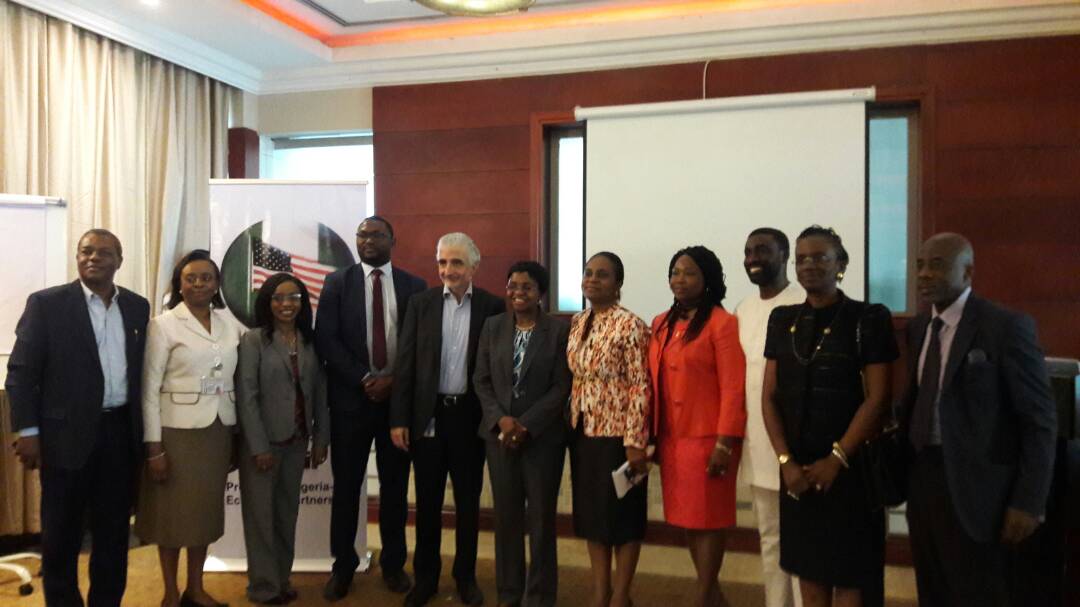NAFDAC Advisory Inspection of Oyigis Farms
October 21, 2017
Food Safety Training for Food Handlers of Quality Foods Africa Limited
March 22, 2018The American Business Council (ABC), the voice of American business and an advocacy platform to expand trade and investment opportunities, hosted the Director General of the National Agency for Food & Drug Administration & Control (NAFDAC), Prof (Mrs.) Mojisola Christianah Adeyeye and her team to a breakfast meeting attended by operators in the food and drug industries, consultants and the vibrant Nigerian press.
Prof Adeyeye made a presentation on her efforts to strengthen the regulatory and control capacity of NAFDAC with a view to facilitating the ease of doing business and reducing the time to market in the 90days since her assumption of duty as the Director General.
Her presentation focused on:
- Building information technology and deployment of e-regulatory tools and e-platforms for all NAFDAC transactions. This includes e-registration through the NAFDAC Automated Product Administration and Monitoring System (NAPAMS), e-permit, e-clearance and Video Conferencing with officers and clients.
- Making new Regulations and reviewing the existing 29 NAFDAC Regulations consisting of Drug (4), Food (18), Cosmetics (3), Herbals (3) and Pesticides (1) to reflect the dynamism in the global regulatory environment
- Product Risk Assessment which involves risk characterization based on the source, classification (taking into account products from stringent regulatory environments), intended use, history of regulatory compliance over the years.
- Import permit application and process which would be electronically done on the e-permit portal
- Advert Control which would adhere to the advert vetting principles of conforming to the principle of fair completion; advert in the interest of all customers and the larger Nigerian society; advert of only NAFDAC registered products; vetting of advert by the Regulatory & Registration Directorate, validity of 1year for approved adverts with an option to increase validity.
CD-ROMs should be submitted for vetting to reduce paper work. The criteria used for vetting would be authenticity; author; claim substantiation and data analysis.
The participants were impressed and energized by the positive changes to expect within a short period of time.
In response to questions asked, the Director General addressed all the issues relating to review of the regulations which she said would involve stakeholders a some point as the draft Regulations, both new and for review, would be on the NAFDAC website for 90days for inputs from the public after which a stakeholders meeting would be held to finalize the document. NAFDAC would hold at least 4 stakeholder meetings per year as the need arises.
On risk categorization, she said that priority would be given to established and credible facilities which will undergo an abridged version of the product registration process. Post Marketing Surveillance (PMS) of NAFDAC regulated products would be strengthened. Collaboration and regulatory convergence with African Regulatory Authorities would also be explored.
NAFDAC would continue to partner with the media to disseminate useful information to the public.
On NAFDAC’s reaction to being asked to leave the Ports, the Director General said the directive presents a huge challenge particularly in the area of drug abuse which is on the increase among the youth population of between 15-35 years of age and appears to have a correlation with NAFDAC absence at the Ports. She believes it will take a mix of politics, co-ordination within the organization and the media to resolve.
On making it easier for SMEs, that cannot afford consultants, to register their products with NAFDAC she said that SMEs do not necessarily need consultants as NAFDAC Guidelines were now more visible on-line and they have been given a 50% discount on registration and a 90day turn around which NAFDAC was working hard on.
In response to the question on NAFDAC expectations from Industry, they were told to ensure that they meet regulatory requirements before sending in applications to avoid unnecessary delays.
In closing, the American Business Council informed that they intended to set up a working group and pledged to work closely with NAFDAC.


